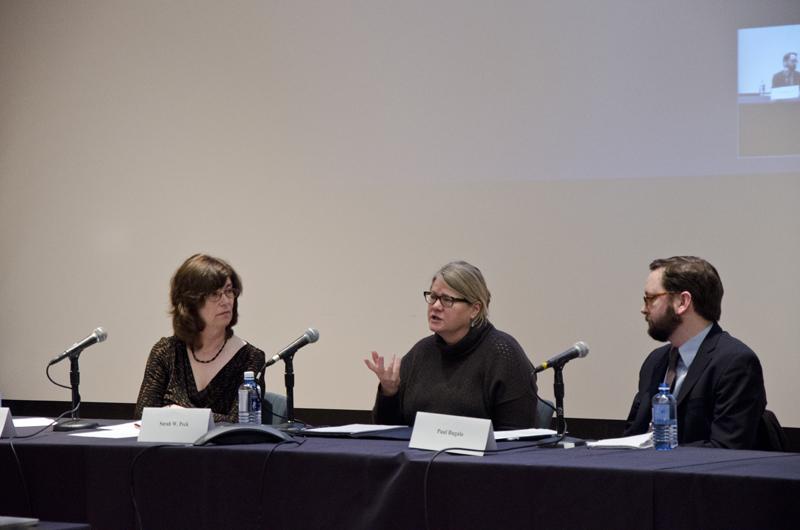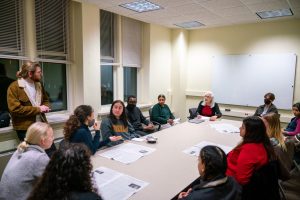Tensions High at Divestment Symposium
Panelists Joyce Babyak, Sarah W. Peck and Paul Bugala discuss and debate the pros and cons of the College’s possible financial divestment from Israel. The Divestment Symposium, which was held on Sunday morning in the Dye Lecture Hall, featured two sets of panelists in two 90-minute sections.
February 14, 2014
Nearly 100 members of the Oberlin community gathered in Dye Lecture Hall to discuss responsible investment in a two-part symposium on Sunday. Hosted by the College administration, faculty and academics from other institutions such as George Washington University were invited to appear on the panel and help facilitate a conversation about divestment and Oberlin’s financial goals for the future. Students Responsible Investment Organization was also invited to speak about the College’s investment plans.
“In terms of issues specifically involving divestment or different ways of trying to get companies to do things that are responsible, the first section was much more useful than the second,” Economics Professor Ed McKelvey said.
According to McKelvey and Professor of Economics Ellis Tallman, the second part of the panel was “muddled by the politics.”
“The second panel overshadowed the issue of the College’s investments and became a discussion of politics,” Tallman said. “In the second half, it became unclear what the objectives were.”
The College’s divestment from particular corporations has been a hot-button issue on campus for years, but has only gained recognition within the last year. Student groups in the community, like Students for a Free Palestine and Anti-Frack, have pushed the administration to withdraw the College’s investment in corporations that endorse specific practices, such as Israeli occupation of Palestinian territory and pollution.
“[RIO] wasn’t trying to advocate for or against any specific issue but instead find a way to talk about and define responsible investment in a safe way,” said College senior and RIO member Andrew Follman.
In 2009, Student Senate, in collaboration with the Board of Trustees, founded Oberlin’s Socially Responsible Investment Committee with the hope of incorporating students in endowment and investing dialogues. In spring 2011, the SRIC released an online list of companies in which the College invested, resulting in the forced disbandment of SRIC that summer.
Since the disbandment of the SRIC, communication about divestment between student groups and the administration has been tense.
“RIO was supposed to help the administration plan the symposium on Sunday, but [it] never sought us out or returned our messages,” Follman said. “We were briefed on what would occur at the symposium, but we were not a part of the planning process like [it] said originally.”
David Roswell, OC ’13 and co-founder of RIO, shared similar sentiments, “In terms of what happened, we learned that [the administration] was planning this set of panels and [it] invited us to get involved initially,” said Roswell. “We were ready to help fund and plan the symposium, but were not contacted until the event was entirely planned.”
“Whether the institution wants to represent its values through investment or change the practices of the corporations that it invests in is unclear,” McKelvey said. “You can divest or you can be a shareholding activist, but it all depends on what your objective is.”
Agreeing with McKelvey, Tallman said, “I think Eve Sandberg made a very good point. Once you divest, you’ve made your statement. It’s the publicity that comes with divestment that makes a difference. When you sell [shares] someone buys [them].”
Although unclear about financial solutions for the institution’s endowment, RIO plans to host its own symposium in the coming weeks.
“RIO will be hosting a policy symposium that will be on March 8 and 9,” Roswell said. “RIO’s symposium will not be focused on divestment but, rather, trying to create policy on what investment means to Oberlin and that may include divestment but may also include other avenues of responsible investment which includes community investment and shareholder advocacy.”


























